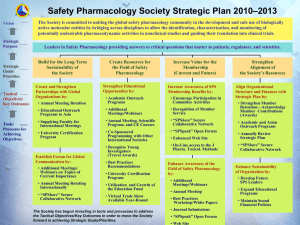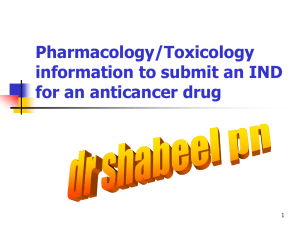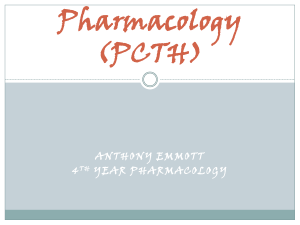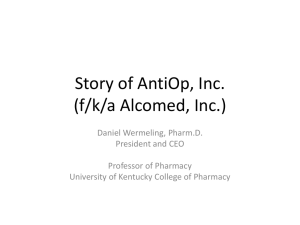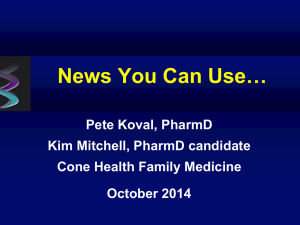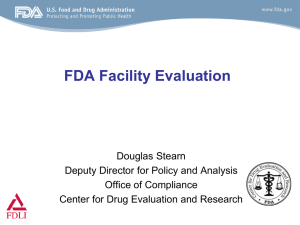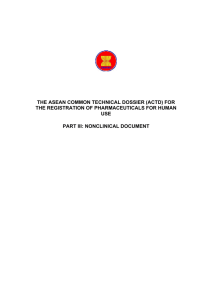עקרונות-בסיסים-בפיתוח-תרופות
advertisement
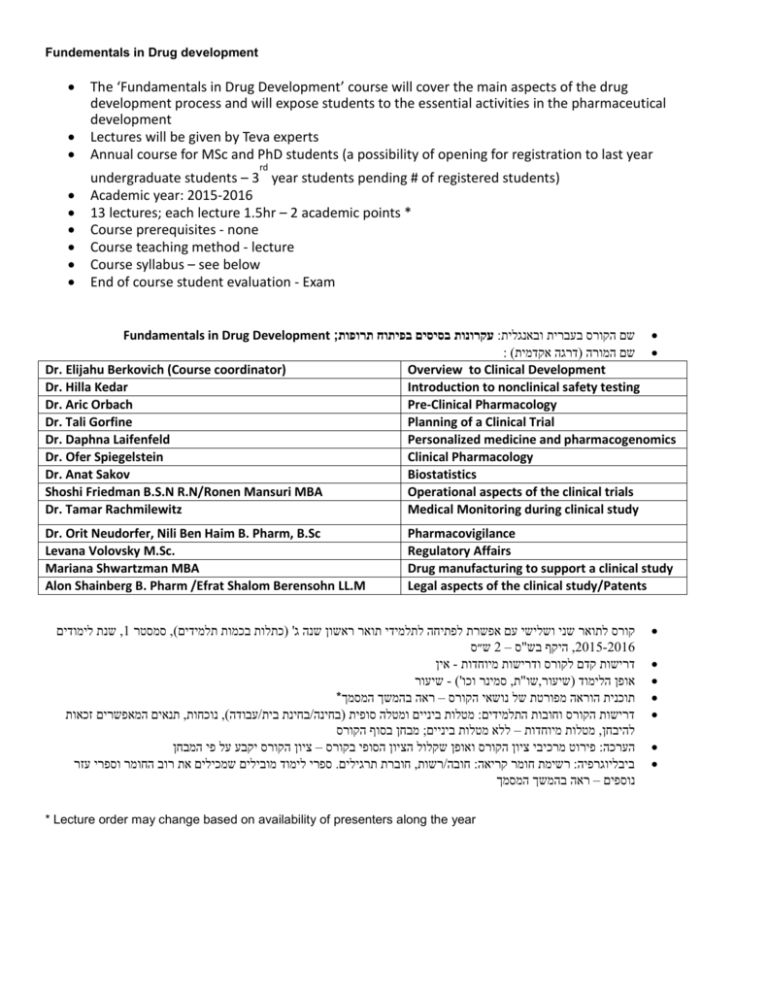
Fundementals in Drug development The ‘Fundamentals in Drug Development’ course will cover the main aspects of the drug development process and will expose students to the essential activities in the pharmaceutical development Lectures will be given by Teva experts Annual course for MSc and PhD students (a possibility of opening for registration to last year undergraduate students – 3 year students pending # of registered students) Academic year: 2015-2016 13 lectures; each lecture 1.5hr – 2 academic points * Course prerequisites - none Course teaching method - lecture Course syllabus – see below End of course student evaluation - Exam rd Fundamentals in Drug Development ; עקרונות בסיסים בפיתוח תרופות: שם הקורס בעברית ובאנגלית : ) שם המורה (דרגה אקדמית Dr. Elijahu Berkovich (Course coordinator) Overview to Clinical Development Dr. Hilla Kedar Introduction to nonclinical safety testing Dr. Aric Orbach Pre-Clinical Pharmacology Dr. Tali Gorfine Planning of a Clinical Trial Dr. Daphna Laifenfeld Personalized medicine and pharmacogenomics Dr. Ofer Spiegelstein Clinical Pharmacology Dr. Anat Sakov Biostatistics Shoshi Friedman B.S.N R.N/Ronen Mansuri MBA Operational aspects of the clinical trials Dr. Tamar Rachmilewitz Medical Monitoring during clinical study Dr. Orit Neudorfer, Nili Ben Haim B. Pharm, B.Sc Levana Volovsky M.Sc. Mariana Shwartzman MBA Alon Shainberg B. Pharm /Efrat Shalom Berensohn LL.M Pharmacovigilance Regulatory Affairs Drug manufacturing to support a clinical study Legal aspects of the clinical study/Patents שנת לימודים,1 סמסטר,)קורס לתואר שני ושלישי עם אפשרת לפתיחה לתלמידי תואר ראשון שנה ג' (כתלות בכמות תלמידים ש״ס2 – היקף בש"ס,2015-2016 אין- דרישות קדם לקורס ודרישות מיוחדות שיעור- )' סמינר וכו,שו"ת,אופן הלימוד (שיעור *תוכנית הוראה מפורטת של נושאי הקורס – ראה בהמשך המסמך תנאים המאפשרים זכאות, נוכחות,)עבודה/בחינת בית/ מטלות ביניים ומטלה סופית (בחינה:דרישות הקורס וחובות התלמידים מטלות מיוחדות – ללא מטלות ביניים; מבחן בסוף הקורס,להיבחן פירוט מרכיבי ציון הקורס ואופן שקלול הציון הסופי בקורס – ציון הקורס יקבע על פי המבחן:הערכה ספרי לימוד מובילים שמכילים את רוב החומר וספרי עזר. חוברת תרגילים,רשות/ חובה: רשימת חומר קריאה:ביבליוגרפיה נוספים – ראה בהמשך המסמך * Lecture order may change based on availability of presenters along the year Fundementals in Drug development Overview to Clinical Development This session will provide an overview spanning new drug idea conception through Investigational New Drug (IND) Application to New Drug Application (NDA) submission and beyond. We will define and explore the various functions/teams involved in drug development, looking into their role at the stages of the drug development process. This will serve as a high level guide and overview to the lectures that will follow where each lecture will revolve around a specific function/topic in the drug development process Bibliography http://www.fda.gov/ForPatients/Approvals/Drugs/default.htm http://www.fdareview.org/index.shtml Guide to Drug Development: A Comprehensive Review & Assessment - Bert Spilker Dr. Elijahu Berkovich – New therapeutic Entities Introduction to nonclinical safety testing The session will briefly introduce the three pillars of nonclinical testing: pharmacology, pharmacokinetics and safety and their role during drug discovery and development. The session will then focus on the nonclinical safety studies required to support clinical development and marketing authorization of pharmaceuticals: the objective of the studies, their design and endpoints as well as their timing during development. Emphasis will be placed on endpoints that cannot be tested in humans (genotoxicity, reproduction and carcinogenicity), fields in which nonclinical safety testing provides a critical part of the risk assessment, even during submission. The predictability of the various nonclinical studies to humans will be discussed, and examples of nonclinical challenges encountered during development will be presented. The importance of working according to Good Laboratory Practice (GLP) regulations will be discussed Bibliography ICH M3(R2) guideline. 11 June 2009. Principles of Toxicology by David L. Eaton and Curtis D. Klaassen. In: Casarett & Doull's Toxicology: The Basic Science of Poisons, Eighth Edition. Unit 1: Editor: Curtis D. Klaassen. Chapter 2, pages 13-48. Publisher: McGraw-Hill Professional Publishing, 2013. CFR - Code of Federal Regulations Title 21 PART 58: GOOD LABORATORY PRACTICE FOR NONCLINICAL LABORATORY STUDIES In: http://www.accessdata.fda.gov/scripts/cdrh/cfdocs/cfcfr/CFRsearch.cfm?CFRPart=58 Dr. Hilla Kedar – Non Clinical Safety Pre Clinical Pharmacology This session will discuss the role of preclinical studies in discovery and development paradigms as employed in today's pharmaceutical industry. These assessments play an important role in the development of new drug candidates. They serve as a guide for clinical development and provide information required for regulatory authorities. Such systems can also be used to investigate novel candidates as well as approved drugs. The talk will focus on methods for understanding a drug candidates therapeutic potential Fundementals in Drug development by combining information of it’s efficacy , pharmacokinetic, metabolic and safety profiles. Examples of the use of in vitro system and in vivo studies at various stages of the drug development will be presented. This talk will emphasis models used for understanding a potential drugs efficacy in disease and elaborate on its mode of action. The advantage and limitations of such models as well as the measures currently used to increase predictability and “translation” of preclinical finding to clinical relevance will be discussed Dr. Aric Orbach – Non-Clinical Pharmacology Planning of a Clinical Trial This session will focus on the Target Product Plan (TPP), the Clinical Development Plan (CDP), planning of a phase II, phase III and phase IIIb/IV study. Translating this plan into a study synopsis, protocol that is submitted and approved by regulatory authorities will be discussed .Examples of different study designs will be reviewed including: population, duration, arms, endpoints, Inclusion/exclusion criteria, procedures and ancillary studies. Dr. Tali Gorfine – Clinical - CNS & Pain Personalized medicine and pharmacogenomics This session will discuss the definitions of personalized medicine, how it can affect individual healthcare through prevention, monitoring, and treatment tailoring. We will go over high level concepts of pharmacogenomics and present some key examples of implementation of pharmacogenomics and personalized medicine to date, as well as discuss the integration of personalized medicine within the drug development process, from drug discovery, to population selection, to clinical trial design, and application in the clinic. Finally, we will discuss the future of healthcare with technological advancement in a patient-focused approach Dr. Daphna Laifenfeld - Personalized Medicine & Pharmacogenomics Clinical Pharmacology This session will discuss the role of pharmacokinetics and pharmacodynamics, the two fundamental disciplines of clinical pharmacology, for drug development. Some basic concepts will be presented, as well as the regulatory expectations from a clinical pharmacology program for a new drug application. Real examples of clinical pharmacology studies conducted by Teva will also be presented Bibliography FDA Clinical Pharmacology guidance: http://www.fda.gov/Drugs/GuidanceComplianceRegulatoryInformation/Guidances/ucm064982. htm Dr. Ofer Spiegelstein - Phase-1 & Clinical Pharmacology Fundementals in Drug development Biostatistics This session will describe the role of the biostatistician prior, during and in closure of clinical trial. The planning of a clinical trial will be discusses: Choosing the model, randomization, power, sample size, drop outs, sequential and adaptive methods for clinical trials, the statistical challenges that arise due to their use and the advantages and disadvantages of utilizing a sequential or adaptive design compared to a standard, fixed-sample design. The process of the Statistical Analysis Plan (SAP), interim analysis, retrospective analysis, metaanalysis and the Database lock will be described. Dr. Anat Sakov – Statistics - Global Biometrics Operational activities of the Clinical Trials/Data Management and Clinical Programming Operational aspects of the clinical trials: This session will focus on the major activities of a study start up, study maintenance and the close out and the different roles of the Global Clinical Operation group in the process. It's including: timeline management, Vendor selection (CRO, labs), County and Site selection, Outsourcing mode of operation and oversight, budget estimation, informed consent, documentation and training method. Data Management and Clinical Programming: The session will include introduction to Data Management and Clinical Programming. As part of the introduction, it will include Roles & Responsibilities of each team, description of the process from Protocol To Data Base Lock and the activities towards Regulatory Submission and Afterwards. The session will describe the Mode of Operation – Outsourcing and the technologies used by the teams Bibliography: http://www.ich.org/fileadmin/Public_Web_Site/ICH_Products/Guidelines/Efficacy/E9/Step4/E9_Guideline.pdf Shoshi Friedman B.S.N R.N - Global Clinical Operations Ronen Mansuri BA/MBA - Global Clinical Programming – Biometrics Medical Monitoring during clinical study This session will focus on the rationale behind medical monitoring and will detail the medical monitoring activities that are conducted during a clinical study including: monitoring plans, monitoring of adverse events and unanticipated problems assessment, safety data review and trend analysis. Examples from ongoing clinical studies will be shared to demonstrate how effective monitoring protects subject safety, and improves the integrity and quality of the trial data. The role of the Data Monitoring Committee and of the Clinical Investigator will also be discussed. Bibliography: FDA Guidance for Industry - Oversight of Clinical Investigations — A Risk-Based Approach to Monitoring, August 2013 FDA Guidance for Industry - Establishment and Operation of Clinical Trial Data Monitoring Committees, March 2006 Dr. Tamar Rachmilewitz - Teva Clinical - CNS & Pain Fundementals in Drug development Pharmacovigilance This session will describe the PhV activities relevant for clinical trials. It will start with a definition of PhV and PhV in Teva. It will explain the importance of managing one global data base and the concept of signal detection. We will introduce the process of collection of serious adverse events from clinical trials. The second part of the session will describe the safety management of a product during development phases: starting on the transition from pre-clinical to clinical phases, going through the assessment of clinical safety data during the clinical development phases, the development of a risk management plan preparation for submission and meta-analysis of data, and post marketing safety studies and signal detection process. Also, the session will describe the various levels of safety assessment leaded by PhV: product safety group, medical scientific group and corporate safety board Bibliography: Pharmacovigilance from A to Z, Barton L. Cobert, MD; Pierre Biron, MD. Detection of New Adverse Drug Reactions, 4th ed. M.D.B. Stephens, J.C.C. Talbot and P.A. Routledge MHRA – Good Pharmacovigilance Practice Guide FDA – Guide to FDA Drug Safety Regulation, FDAnews. Dr. Orit Neudorfer - Global Pharmacovigilance Nili Ben Haim B. Pharm, B.Sc - Global Pharmacovigilance Regulatory Affairs The session will present the regulatory aspects of drug development from the initial discovery to the final marketed product, including RA strategic planning, meetings with regulatory agencies (US vs EU procedures), obtaining permission for clinical trials (IND & CTA submissions) manufacturing authorization applications (structure and content, special designations, US vs EU assessment procedures), proper composition of product information and labelling and product lifecycle (postapproval submissions). Bibliography: Communication from the Commission 2010/C 82/01 — Detailed guidance on the request to the competent authorities for authorisation of a clinical trial on a medicinal product for human use, the notification of substantial amendments and the declaration of the end of the trial (CT-1), March 2010 United States Code Title 21, Part 312, Investigational New Drug Application, April 2012 FDA Guidance for Industry: Formal Meetings Between the FDA and Sponsors or Applicants, May 2009 European Commission: Notice to Applicants Vol. 2A: Procedures for marketing authorisation, June 2013 European Commission. (2008, May). Volume 2B: Notice to Applicants: Medicinal products for human use. Presentation and format of the dossier: Common Technical Document (CTD). Fundementals in Drug development U.S. Food and Drug Administration: New Drug Application, May 2012 The CDER Handbook, produced by the Department of Health and Human Services, Food and Drug Administration, March 1998 CDER 21st Century Review Process, Desk Reference Guide, produced by the Department of Health and Human Services, Food and Drug Administration, September 2014 Beishon M., Approval rating: how do the EMA and FDA compare?, 12 I CancerWorld I January-February 2014 Navigating the Regulatory Landscape for Healthcare Product Development: Key principles and best practices, MaRS Discovery District, October 2012 Levana Volovsky M.Sc. - Global RA Drug manufacturing to support a clinical study To be added Mariana Shwartzman MBA - Pharmaceutical Ops. Jan 10 2016 Legal aspects of the clinical study Legal – To be added Patents: This session will deal with introduction to patents in the pharmaceutical world What is a patent, why do we need it and what is the philosophy behind it, the different type of patents in the pharmaceutical industry and specific basic concepts in the patent law. The session will also focus on patent infringement & patentability issues – what activities are defined as infringing, IP and R&D activities and ways to challenge validity of patents. In addition, we will have a brief discussion on the unique patent system in the US Dr. Alon Shainberg – Patents/Efrat Shalom Berensohn LL.M - Legal

